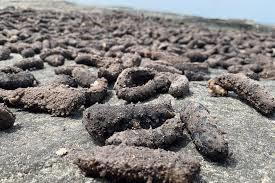Liberia: Liberia Eyes Sea-Cucumber Fisheries

The sea cucumbers are left out to dry after being caught
Liberia may be sitting on a potentially valuable trade in Sea Cucumbers.
The slimy, sausage-shaped members of the starfish family may have limited market but the demand for it in China, where it is used as both a culinary delicacy and a medicinal ingredient, is growing.
Not wanting to miss out on cash, stakeholders in the fisheries sector have now validated a management plan for sea-cucumber fishery across the country.
The intent is to cash in on the growing sea cucumber trade and improve the livelihood of people in the coastal communities, while boosting the country’s revenue generation capacity.
Sea cucumbers, a nutritious and medicinal ingredient species, are a fundamental component of shallow-water ecosystems that can be an important resource for coastal livelihoods.
The validated plan, according to Augustine Manoballah of the National Fisheries and Aquaculture Authority (NaFAA) will provide a framework that will enable the government to guide, monitor and control the exploitation and harvesting of the sea cucumber in the country.
Manoballah, who is the Deputy Director for Administration at NaFAA, noted that Sierra Leonean and Chinese fishing vessels have been exploiting the species in the remote part of River Cess, one of the coastal fishing counties where it is in abundance.
Manoballah said the exploitation by the foreign vessels was unearthed during an assessment done in 2019 to ascertain the different potentials of fisheries resources in the country.
He disclosed that those foreign divers were diving for the species, processing it through boiling and sun drying, and selling it to the Chinese who then exported it to Asia.
“NaFAA did not benefit whatsoever in License and export fees,” he narrated.
He said further that the species were of great importance to the ecosystem and that overfishing could lead to the collapse of other fishery subsectors.
“That over 70% of the world’s edible sea cucumber species were overexploited including the Sierra Leonean,” he explained.
Manoballah said “Based on our limited knowledge about the fishery, NaFAA quickly requested technical assistance from FAO, licensed two canoes with 8 divers for data purposes, and also partnered with Tom Collinson who was doing his master’s thesis.
“We wanted to understand the species found in Liberia, and their distribution along the vast coastline of Liberia; their status, the biological characteristics of the species and eventually develop a management plan,” he disclosed.
He said NaFAA was pleased about the development of the management plan and the country stands ready to fully implement the plan.
“We will ensure sustainable harvest, and empower divers with the necessary tools to facilitate timely reporting, conduct additional training for fisheries enumerators and inspectors, and monitor & control possible encroachment from neighboring coastal countries.
“The success of this will herald the development of additional management Plans for other fisheries in Liberia. Implementing this plan will serve as a source of revenue for the government and will create job opportunities for Liberians,” he added.
According to him, this is the first time that the country is having a species-specific management plan, stating to the partners the effort will not be the last.
“Similar concept will be applied to other species, especially our highly valuable shrimp fishery,” he assured.
Also speaking, the country representative of FAO, Mariatou Njie expressed gratitude to the Fisheries Authorities for their continuous support and cooperation.
She said sea cucumber fisheries was selected as the initial pilot and FAO was requested to provide technical support to assess the current operation, status and requirements of the local species and support the development of a more formalized management framework.
“I am pleased to have you all here today to present the results of the project, and the related publications jointly developed by FAO and NaFAA, during today’s workshop. I hope you are happy with the results of this very first Fisheries Management Plan and wish you a successful implementation of it,” she said.
Fisheries is critical for the improvement of food and nutrition security as it provides 65% of the animal protein for many Liberians. It also serves as a source of employment for residents in the fishing communities as well as foreign income earnings for the nation.
The fisheries management plan for sea cucumber fishery, which was developed as a result of a request from the Liberian government, to the Food and Agriculture Organization (FAO) and the European Union, was validated during a two day workshop held in Monrovia. The request was made through the National Fisheries and Aquaculture Authority for technical assistance.
